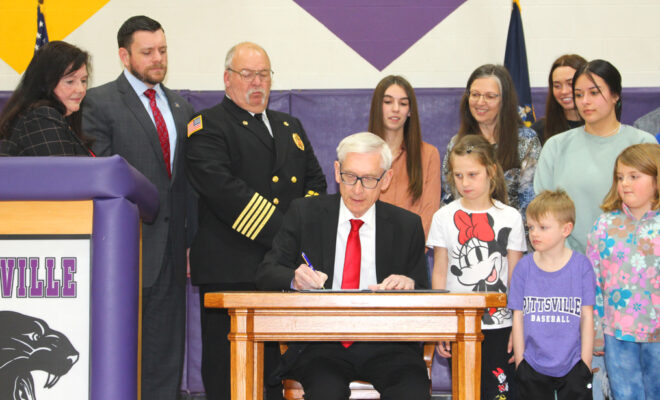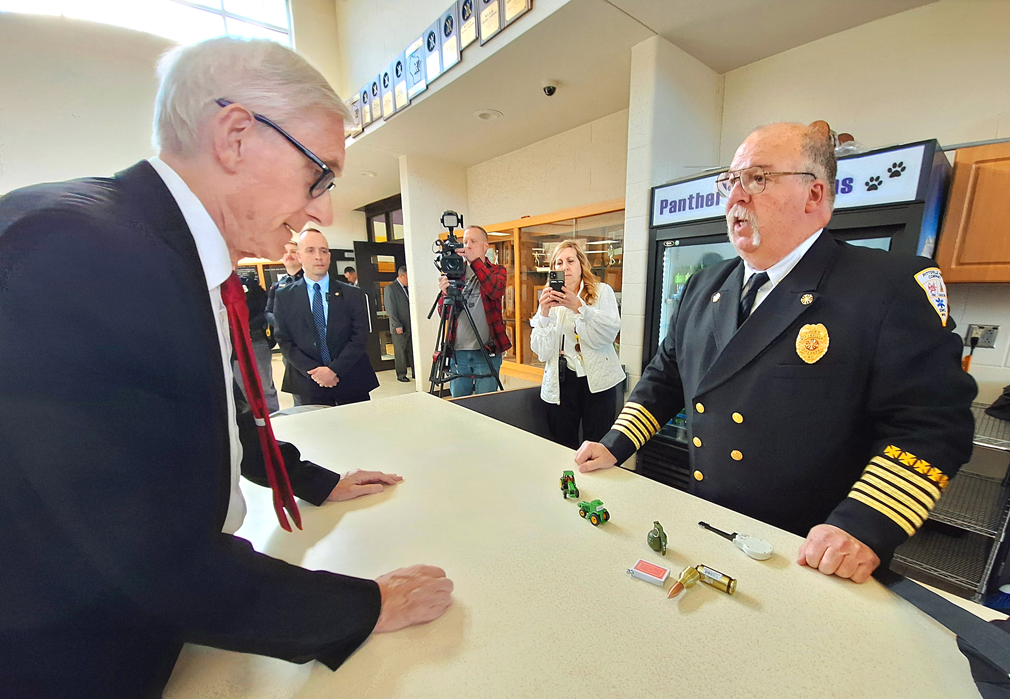Gov. Evers signs novelty lighter bill

Gov. Evers signs a bill April 5 at Pittsville Elementary School, which bans the sale of novelty lighters in Wisconsin. Joining PreK-12 students were (L-R): Rep. Nancy VanderMeer, Sen. Patrick Testin, Pittsville Fire Chief Jerry Minor, his granddaughter Kaitlyn Potts, who had the idea for the legislation, and her second-grade teacher, Londa Kuehn, who helped Potts and her classmates craft the bill.
Legislation was 16 years in the making
By Mike Warren
MMC staff writer
PITTSVILLE — The family and the home are gone now, but the images of a tragic spring day in 2008 never did leave the memories of those in Pittsville who knew Mason Stasheck. That’s why the events of April 5 were bittersweet for many who were in attendance, as Gov. Tony Evers sign a piece of legislation first mentioned just a handful of months after Mason’s death.
“We had a fatality fire earlier that year that was a classmate of the second graders in the fall,” Pittsville Fire Chief Jerry Minor told us during our April 3 interview. “In October, my granddaughter came home and there was an article in the Weekly Reader that said, ‘Lighters are not toys,’ and she handed it to me and she said, ‘Grandpa, you need to make a law,’ and that’s where it started.”
Mason Stasheck was the younger brother of a classmate of Kaitlyn Potts, Minor’s granddaughter who went to him with the idea of banning toy-like lighters, like the one that Mason used to set the fire that led to his death from smoke inhalation.
“I thought that it was crazy that there were toy lighters, so I went and I told my grandpa we needed to do something about it,” said Kaitlyn Potts, now 23, after the bill had been signed.
Gov. Tony Evers signed the bill in the gymnasium at Pittsville Elementary School where Mason was just getting a start on his education.
“It was definitely a tragedy in the community,” said elementary teacher Londa Kuehn, who guided that second-grade class through those tough life lessons all those years ago now. “We needed to meet their emotions and talk about that, and their compassion for the family, for the community and that yearning to want to make a difference. So the facilitation of that yearning is what brought about this bill.”
Assembly Bill 917, now 2023 Wisconsin Act 271, prohibits the sale of counterfeit and unsafe lighters to help combat the dangerous rise in knock-off lighters that fail American Society for Testing and Materials (ASTM) Standards.

“Unfortunately, counterfeit and unsafe lighters are unknowingly being purchased every day by consumers and retailers,” Gov. Evers said in prepared remarks prior to signing the bill. “These unsafe lighters are a threat to the safety of our communities, our families and our kids,” Evers continued. “Kids are especially vulnerable to the dangers of unsafe lighters and fire-play, and unfortunately the folks here in Pittsville know that tragedy first-hand. Not only do these unsafe lighters endanger the lives of kids and our families, but they also place a burden on our emergency response personnel, who – with great courage – combat these preventable disasters. This law prioritizes the safety of our communities by taking these harmful lighters off the market and providing resources to customers, store owners and distributors to ensure they’re making informed decisions when making a purchase.”
Legislation aiming to prohibit the display and sale of certain lighters to minors had been introduced during almost every legislative session since 2009 but had failed to pass both the Assembly and the Senate until now. Evers, a former teacher and state school superintendent, was elated to be the one to sign the bill into law.
“It’s something you just can’t predict,” Gov. Evers told us after the bill-signing ceremony. “It started here. The fire chief and others worked really hard to make it happen here in Pittsville, and now here I am signing it into law sixteen years later. It’s amazing.”
Gov. Evers had heard of the legislation, but did not realize its path to signage had taken nearly two decades, nor did he realize the bill was the result of a fire-related death in the community.
“It’s also a good learning lesson for the students here, certainly about the safety issue, but also how government works,” Evers added.
Evers said he had asked Chief Minor the same question we asked the governor. This seems like a no-brainer, so why did this take so long?
“You know, he (Minor) would get pushback about Nanny State and is this really the role for government and that sort of thing,” Evers told us. “Well, something that causes kids to have a fire in their house and somebody died, that’s a big deal and we needed to respond and [it] took 16 years, but we did.”
What Minor thought was going to be “a slam dunk” took multiple hearings over numerous legislative sessions.
“We wrote letters to the current senators and assembly people and to Governor Doyle at the time,” Minor said. “Amy Sue Vruwink was our lead in the Assembly and Julie Lassa was our lead in the Senate and they had the bill written and we started going to hearings and I can’t even begin to tell you how many hearings we went to,” Minor recalled. “The kids came along on some of them. I think we tried everything we could come up with for all those years.”
Minor said there were several years when nothing happened, not even a hearing. Then he said the COVID-related pandemic derailed the bill yet again. And that’s when an unlikely ally came along.
“We were approached by BIC Lighter on this, and they didn’t know that we already had been trying this,” said Minor. “And they came onboard hot and heavy and they had a lot of contacts within the Capital from previous issues.”
Before Minor knew it, the bill had cleared both the Assembly and the Senate with very little opposition, and was ready for the governor’s signature.
“It actually took me a couple days to realize that it’s done,” said Minor. “Sometimes it doesn’t feel like it’s real yet.
“I don’t recall the number of states that have banned them. It’s quite a few and we wanted to be part of that,” Minor added. “BIC came on board with us as a huge partner, and we’ve always had the support of the lighter association.”
Following the bill-signing ceremony, Chief Minor demonstrated some novelty lighters for Evers, who had not seen them prior to his Pittsville visit.
“No I haven’t and I’ll tell ya, that is one scary thing,” the governor said during our conversation. “To think that something that doesn’t look like a lighter is a lighter, that’s a bad start. It minimizes the fact that what’s inside and what you use it for is really dangerous.”
The lighter Mason used in 2008 is not known. Minor said all but the metal components melted and were destroyed in the fire.
Assembly Bill 917 passed with bipartisan support and support from the Professional Fire Fighters of Wisconsin, Wisconsin Sheriffs and Deputy Sheriffs Association, Wisconsin State Fire Chiefs Association, and the Wisconsin State Firefighters Association.
Assembly Bill 917, now 2023 Wisconsin Act 271:
Provides that no person may offer for sale or sell, or offer a free sample of, a counterfeit lighter or unsafe lighter;
Provides that the prohibition would not apply to any of the following:
The interstate transportation of counterfeit or unsafe lighters that pass through Wisconsin; or
The storage of counterfeit or unsafe lighters in a warehouse or distribution center if the warehouse or distribution center is not open to the public for the purposes of retail sale or distribution.
Defines lighter as any electrical or mechanical device that operates using any type of fuel and that is intended for use in igniting cigarettes, cigars, pipes, charcoal or gas grills, or fireplaces;
Defines counterfeit lighter as a lighter that infringes on an intellectual property right of a citizen of the United States or a person that is protected by federal or state intellectual property law; and
Defines unsafe lighter as:
A disposable or refillable cigarette, cigar, or pipe lighter that does not comply with ASTM International standard F400-20.
A utility, grill, or fireplace lighter, a lighting rod, or a gas match that does not comply with ASTM International standard F2201-20.
Prior to Gov. Evers signing the bill, Minor had a special message to all members of the Pittsville student body who had gathered to witness the historic occasion.
“When you get an idea about making something safer for others, when you get or are asked to pursue an idea that others feel is a good thing, when you know your idea is a good one, don’t let go of it. Keep working to get it accomplished. Keep telling your story. Keep looking for support to make it happen. You can realize your dreams and ideas, but nothing comes easy. Don’t give up when you know it’s the right thing.”
“I think that this journey and the way that I got to see my grandpa really take control and make it a reality was really awesome,” Potts told us. “So proud of him.”
Leave a reply
You must be logged in to post a comment.




